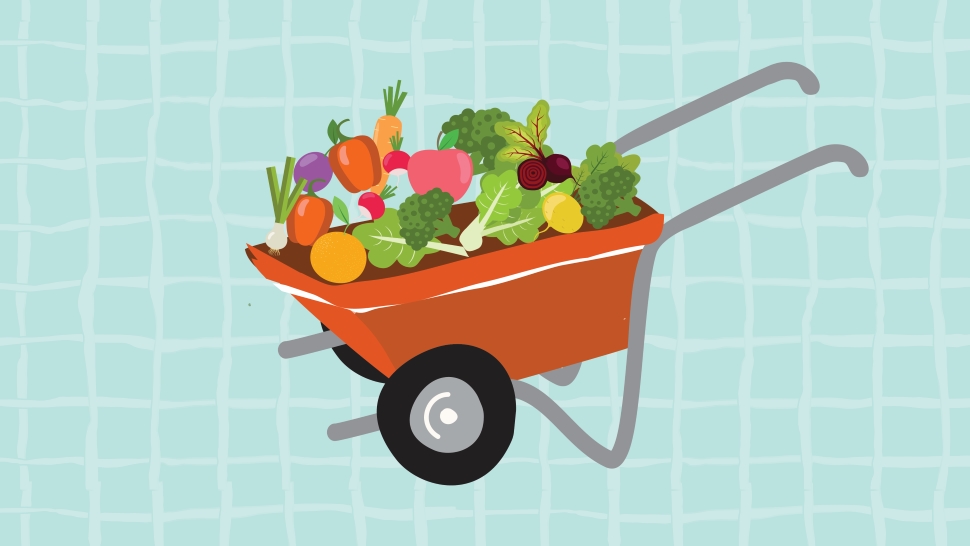
During this year’s Eat Local Challenge, Bon Appetit is helping our guests not only eat locally, but shop locally too. And while we all enjoy visiting a farmers’ market or a local farmstand, it’s worth exploring the myriad other benefits that local food and strong local food systems can provide.
In recent decades, non-profits, as well as cities, states, and even the federal government have enacted policies and programs that use local food as a powerful tool to strengthen communities. One of the most pressing issues that have been targeted is food insecurity. According to Feeding America, roughly 38 million people, including 12 million children, are considered food insecure in the United States.¹ This food insecurity is concentrated in what was previously referred to as food deserts, areas where residents have few to no convenient options for securing affordable and healthy foods – especially fresh fruits and vegetables.²
More recently, a new term has been suggested that takes into account the racially discriminatory practices that have led to food insecurity in these areas. “Food apartheid” more accurately describes this racialized access to healthy, nutritious food, and positions local food sovereignty as a solution.³ Programs across the country have sought to ameliorate food apartheid in a variety of ways, including community gardens and school lunch programs. We’ve provided an overview of just a few of these inspiring programs below:
Minneapolis Farm to School
Minneapolis Farm to School strengthens connections between all of the key actors in the local food system – students, local farmers, and the broader community. Farmers from the broader Twin Cities area supply fresh, local ingredients for school meals across the Minneapolis food system. Farm to School then creates “experiential learning opportunities for students to explore, taste, and grow food.” ⁴ Bon Appetit Farm to Fork vendor Open Hands Farm has been a long-time participant in the Farm to School program.
GrowNYC Food Access Programs
New York City’s GrowNYC food access programs include the famed Greenmarkets, nearly 50 farmers markets that occur in neighborhoods across the city, multiple times a week. These markets are strictly producer-only, which means that the farmers and makers from parts of Pennsylvania, New Jersey, and New York who bring their products to market can only sell what they grow or make themselves. GrowNYC also maintains a Farmstands program that trains and employs young people to sell fresh, affordable food grown by farmers’ across the northeast in New York City’s neighborhoods.⁵
Easton Garden Works
Easton, Pennsylvania, a small city along the Delaware River, punches above its weight when it comes to its community garden program. Easton Garden Works, a program of the non-profit Greater Easton Development Partnership, maintains six community gardens across the city, allowing residents, many of whom cannot walk to a grocery store, to grow their own produce each growing season. Community access to the gardens is paired with a community-wide composting program and suite of programming aimed to empower residents to grow their own food.⁶
Planting Justice
A non-profit organization, Planting Justice has taken the theory of food sovereignty and put it into practice. To date, the organization has built over 450 edible gardens throughout the San Francisco Bay Area, where it is based. Recently, the organization has moved to begin building urban farms and job training centers to fulfill their mission to “empower people impacted by mass incarceration and other social inequities with the skills and resources to cultivate food sovereignty, economic justice, and community healing.”⁷
- https://www.feedingamerica.org/hunger-in-america
- https://www.aecf.org/blog/exploring-americas-food-deserts
- https://www.nrdc.org/experts/nina-sevilla/food-apartheid-racialized-access-healthy-affordable-food
- https://nutritionservices.mpls.k12.mn.us/f2s_program
- https://www.grownyc.org/greenmarket/farmers
- https://westwardeaston.org/gardens/
- https://plantingjustice.org/about/#:~:text=Food%20Sovereignty&text=In%20the%20last%2010%20years,and%20scale%20of%20this%20work.